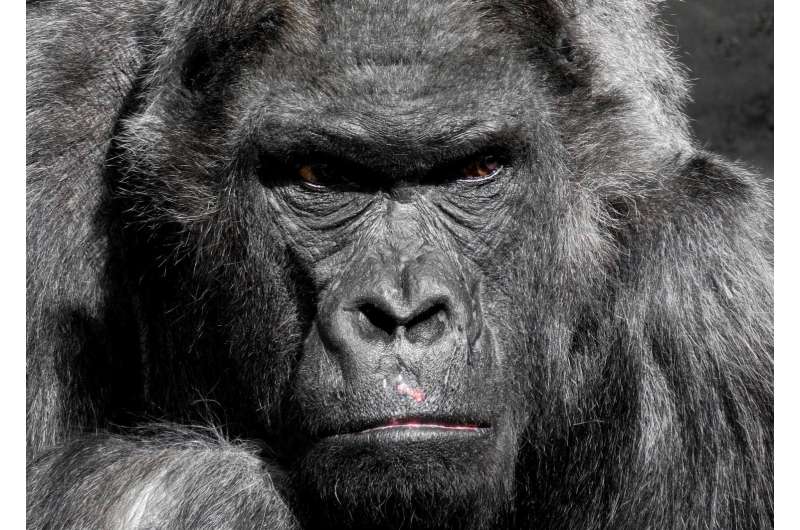November 28, 2016 report
Gorilla mobs attacking single individuals suggests new type of behavior for them

(Phys.org)—A trio of researchers studying gorillas in Karisoke Research Center in Rwanda has reported on a developing trend observed in mountain gorillas—mobs attacking single individuals for unknown reasons. In their paper published in Scientific Reports, Stacy Rosenbaum, Veronica Vecellio and Tara Stoinski describe three mob attacks that have been observed by several human witnesses over the past decade and offer some possible explanations.
For most of the modern study of gorillas in their native environment, the consensus has been that they are generally docile with one another—there have been observations of males fighting, sometimes to the death, but for the most part, the life of the gorilla was thought to be one of mostly peaceful. But now, it appears that the peace can be disturbed by the occasional mob attack on a single individual or, as the researchers note, two individuals.
In the first witnessed attack, back in 2004, Rosenbaum was actually one of the witnesses. She describes the incident as arising seemingly out of nowhere. A single male the team had named Inshuti approached a group of gorillas the researchers had named the Beetsme. After some initial rebuffs, the lone male continued to seek acceptance. Then one of the gorillas screamed—the witnesses could not say if it was Inshuti or a member of the group. That was followed by three adult males chasing Inshuti until they caught him and pinned him to the ground. Soon thereafter, the rest of the Beetsme group arrived and all of them (including females and youngsters) participated in causing harm to Inshuti—from pulling hair to scratching and kicking. The leader of the Beetsme sunk his teeth into the gorilla's flesh and shook it like a fighting dog. The mob attack continued for just a few minutes, but then stopped just as quickly as it had started. The attackers walked away and Inshuti slunk into the underbrush to attend to his wounds.
The researchers report on two other similar incidents, one of which included an attack on Inshuti and another male. They note that mob attacks by other apes, including chimps, is common, as in humans, but until these recent incidents, it was thought gorillas were gentle giants, unlikely to engage in such violence. The team admits they do not know why the gorillas have begun acting like mobs at times but note that it has occurred during a time when the mountain gorilla population has grown due to conservation efforts.
More information: Stacy Rosenbaum et al. Observations of severe and lethal coalitionary attacks in wild mountain gorillas, Scientific Reports (2016). DOI: 10.1038/srep37018
Abstract
In humans and chimpanzees, most intraspecific killing occurs during coalitionary intergroup conflict. In the closely related genus Gorilla, such behavior has not been described. We report three cases of multi-male, multi-female wild mountain gorilla (G. beringei) groups attacking extra-group males. The behavior was strikingly similar to reports in chimpanzees, but was never observed in gorillas until after a demographic transition left ~25% of the population living in large social groups with multiple (3+) males. Resource competition is generally considered a motivator of great apes' (including humans) violent intergroup conflict, but mountain gorillas are non-territorial herbivores with low feeding competition. While adult male gorillas have a defensible resource (i.e. females) and nursing/pregnant females are likely motivated to drive off potentially infanticidal intruders, the participation of others (e.g. juveniles, sub-adults, cycling females) is harder to explain. We speculate that the potential for severe group disruption when current alpha males are severely injured or killed may provide sufficient motivation when the costs to participants are low. These observations suggest that the gorilla population's recent increase in multi-male groups facilitated the emergence of such behavior, and indicates social structure is a key predictor of coalitionary aggression even in the absence of meaningful resource stress.
Journal information: Scientific Reports
© 2016 Phys.org



















